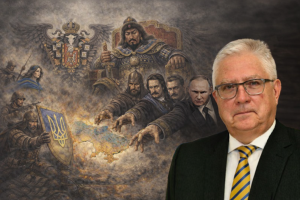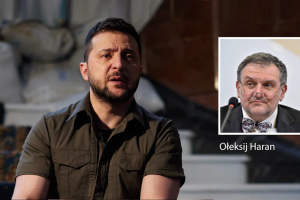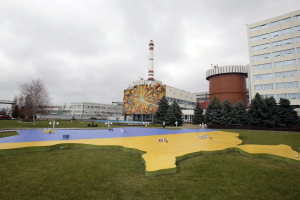

For Friedrich Naumann Foundation For Freedom
Russia's full-scale invasion of Ukraine has been halted in almost all directions. Having suffered military defeats in the Kyiv, Chernihiv, and Sumy directions, Russian troops were forced to retreat or even flee.
At the same time, the available resources were transferred to the territory of the Donetsk, Luhansk, and Kharkiv regions, as well as to the South - Zaporizhia and Kherson regions. Accordingly, active hostilities continue. The Russian military has suffered heavy losses and Western sanctions are hitting the Russian economy, but the overall resource of the Russian armed forces still outweighs Ukraine's military capabilities. Despite Russia's military and technical superiority, the Ukrainian army has shown high efficiency, and accordingly, it can be assumed that Russia will face fierce resistance when trying to advance in these territories.
Western and Ukrainian intelligence services are confident that in the event of a successful offensive in the Donetsk, Luhansk, and Kharkiv regions, Russia will again attempt to attack Kyiv and central Ukraine. Although the capture of Kyiv or most of Ukraine seems highly unlikely, it is necessary to outline the prospects that Ukrainian society and European countries can expect in the event of such a scenario. Today, Russia practically does not hide its initial plans for Ukraine and speaks about them almost openly.
Russia's 'denazification'
The stated Russian goals of the military special operation included the ‘denazification’ of Ukraine. Ukrainian and Western experts, of course, were extremely surprised by this wording. Yes, there are some neo-Nazi groups in Ukraine as well as a number of extreme right-wing parties. However, the size of this movement is comparable to other European countries. Politically, the extreme right-wing parties have no representation in parliament, and the President of Ukraine is a Russian-speaking Ukrainian of Jewish descent. Moreover, any propaganda of the communist and Nazi regimes and their symbols is prohibited by law in Ukraine. Accordingly, any statements about the Nazis in the Ukrainian government are extremely ridiculous for anyone who is even slightly immersed in the Ukrainian political context. But it should be understood that the term ‘denazification’ for the Russian government has a completely different context and has nothing to do with the generally accepted meaning of this term.
So what does the Kremlin mean by denazification? On April 4, 2022, the Russian state propaganda media published a "What should Russia do with Ukraine?" article, where, finally, the Russian understanding of ‘denazification’ was described. Much attention has been paid to this article because this media often becomes a mouthpiece of Russian propaganda and its vision of the world order.
It is worth mentioning that the article is not the first sign of adjusting the rhetoric of Russian propaganda. Earlier, Russian state media reported that most Ukrainians were ‘Nazis’ and needed to be ‘re-educated’ and those ‘especially active’ destroyed. However, this article essentially concludes the process of adjusting the rhetoric of Russian propaganda, accusing not only the Ukrainian government and the mythical Nazis of seizing power but almost all Ukrainian people of supporting Nazism (whatever that means). This article, in fact, can be seen as an applied document that continues Putin's rhetoric about the ‘wrongness’ of Ukraine's existence, which needs to be ‘corrected’ by Russia. The text of the document justifies large-scale repressions against Ukrainians and argues for the need to liquidate Ukraine as a state. In general, the program provisions of the article include:
1) de-Ukrainization and de-Europeanization
2) strict censorship in politics, education, and culture
3) the formation of the so-called "people's" republics on the territory of Ukraine
4) repressions against all undesirable elements
In fact, Russian propaganda has finally decided what to say to the audience in the context of ‘denazification.’ The term covers the denial of the existence of Ukraine as a state and the Ukrainian people as an independent national entity. This is the case when the Russian propaganda machine was anyway forced to admit and fix the key goals of the Russian government.
It is important to understand that adjusting Russian propaganda does not mean that the goals have changed. On the contrary, the failure of the Russian invasion in the first stage forced the Russian propaganda machine to join in with a real sense of explaining to society why this war had begun. In fact, the “Final solution to the Ukrainian question” was the key goal of the Russian invasion from the very beginning. As we can see, the propaganda works quite effectively: 74% of Russia's population supports a "special military operation." Although the objective sociology of autocratic regimes is unreliable, it is safe to say that the Russian people are more likely to support the government's actions and policies of planned repression.
Words and actions
For observers unfamiliar with Russian-Ukrainian relations and history, the scenario of planned repression may seem unlikely. The article and the messages of Russian propaganda are more reminiscent of the propaganda of totalitarian regimes of the 20th century than the real plans of the state in the 21st century. However, all these plans are much more realistic than one might think. Examples of liberated Ukrainian cities show that mass killings of civilians took place in these areas. The scale of the killings and repressions was so great that it is impossible to speak of coincidence: the army command had to know about these phenomena and their scale. Accordingly, these killings were committed with the permission (or order) of the top military leadership.
Additional evidence that Russia has planned and continues to plan mass repression of Ukrainians is Western intelligence reports of lists of Ukrainian politicians and public figures who need to be eliminated or arrested after seizing power. Accordingly, it is safe to say that such articles do reflect Russia's plans if it succeeds in its military campaign.
What does it mean for Ukraine and Europe?
The described goals of de-Ukrainization of Ukraine for Russia cannot be achieved only by repression against the ruling or cultural elites. The vast majority of the population of Ukraine now categorically does not accept any Russian narratives, which are confirmed by operational public opinion polls. Moreover, Russian-speaking Ukrainians have suffered the most from Russian aggression, many of whom do not see the possibility of reconciliation with Russia. Thus, 63.5% of refugees who went abroad speak Russian at home (for comparison, 36% of the total population of Ukraine). Accordingly, even if Russia can occupy new territories, it will be able to achieve its goals only through mass terror and genocide. Whether it will do so - yes, examples from Bucha and the liberated cities confirm this.
If Russia succeeds in achieving its goals by military means, it will mean only one thing: terror and repression against the civilian population on a huge scale. This will further deepen the migration and humanitarian crisis in Ukraine and Europe.
To prevent the worst-case scenario from happening, Russia must be stopped in the first place militarily. If the Russian army fails to advance and the Ukrainians liberate the previously occupied territories, many problems can be avoided. Thus, currently, 80% of refugees from Ukraine in Europe want to return home. Ukraine's military victory will be the factor that will reduce the number of problems caused by Russia.
© picture alliance / NurPhoto | Ceng Shou Yi








